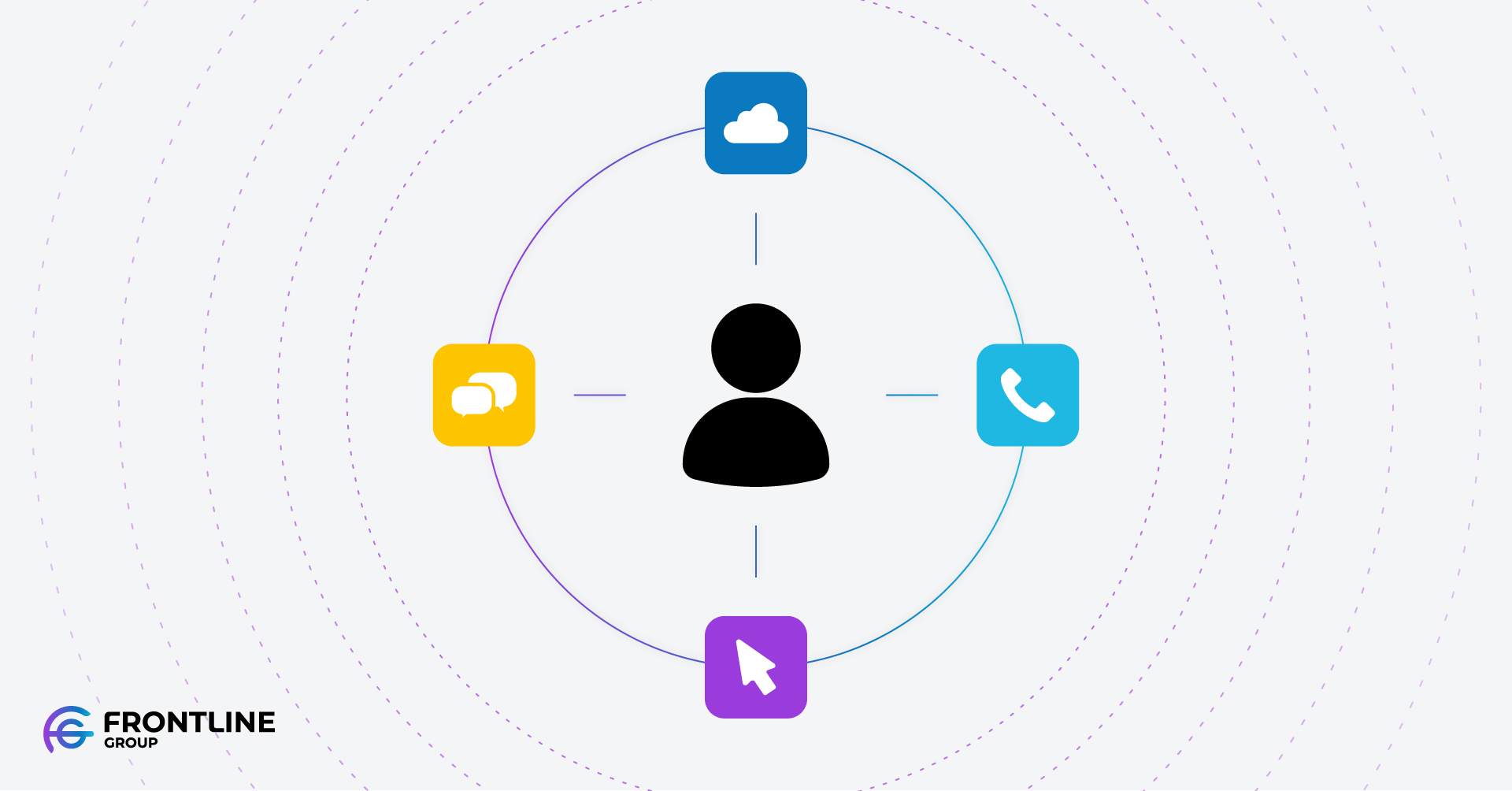
As customer expectations continue to rise, businesses are under increasing pressure to provide seamless, consistent support across multiple platforms. Customers today want to connect with brands in ways that are convenient for them, whether that’s through phone calls, social media, web chat, or email. But more than just having multiple ways to get in touch, customers now expect these channels to work together, allowing them to move between platforms without losing continuity.
This is where an omni-channel contact center comes into play. Unlike a multi-channel approach, which offers different channels that operate independently, an omni-channel contact center integrates these channels to create a unified, cohesive experience. While many contact centers, including Frontline Group, offer robust multi-channel solutions that provide diverse touchpoints for customer support, businesses are increasingly exploring omni-channel strategies to further elevate the customer experience.
Let’s explore what an omni-channel contact center is, the unique benefits it provides, and how it differs from a multi-channel approach. Understanding the value of omni-channel support can help businesses consider the best next steps for meeting evolving customer needs.
Defining an Omni-channel Contact Center
An omni-channel contact center takes customer service a step beyond the traditional multi-channel model by fully integrating all communication channels into a cohesive system. While a multi-channel contact center offers multiple touchpoints, such as phone, email, and web chat, these channels often operate independently, meaning customer interactions may not carry over seamlessly between platforms. In an omni-channel contact center, however, all channels are interconnected, allowing agents and customers to move fluidly between platforms without losing context.
What is an Omni-channel Contact Center?
An omni-channel contact center is designed to create a unified customer experience across every interaction, regardless of the platform. For instance, a customer might start a conversation with a chatbot on a website, and then transition to a live agent over the phone, all while keeping the context of the initial conversation intact. This integration enables agents to view the full history of a customer’s interactions, making it easier to provide personalized, relevant support.
Key Features of Omni-channel Support
The primary goal of an omni-channel contact center is to ensure continuity and consistency. Key features include:
Integrated Customer Profiles: By consolidating customer data across all channels, agents have immediate access to a customer’s history, preferences, and past interactions, which helps improve response times and personalization.
Cross-Channel Continuity: Customers can move seamlessly between channels like web chat to phone, without needing to repeat information or start over, creating a smoother experience.
Real-Time Data Synchronization: Updates made in one channel are immediately reflected across all channels, keeping information consistent and accurate.
By enabling a truly connected experience, omni-channel contact centers provide customers with the convenience of choice and the benefit of continuity, making each interaction more efficient and personalized.
Benefits of an Omni-channel Contact Center
An omni-channel contact center offers several benefits that enhance the customer experience and streamline operations. By creating a unified system where all communication channels work together, omni-channel support delivers seamless interactions, greater satisfaction, and improved efficiency. Here are some key benefits of an omni-channel contact center:
Seamless Customer Experience
With an omni-channel approach, customers can switch between channels without losing continuity in their interactions. For example, a customer might start with a live chat on a website, then move to a phone conversation if they need more detailed assistance, all while the agent can see the entire conversation history. This fluid transition reduces customer frustration, as they don’t need to repeat information or start over, leading to a more satisfying experience.
Improved Customer Satisfaction
Omni-channel support enables agents to provide a more personalized experience by giving them access to the customer’s complete interaction history. This level of insight allows agents to tailor their responses to the customer’s needs and preferences, resulting in faster resolutions and higher customer satisfaction. With a consistent experience across channels, customers feel valued and understood, which strengthens brand loyalty.
Enhanced Agent Efficiency
Because agents have access to integrated customer profiles and real-time updates across all channels, they can respond to inquiries more quickly and accurately. This unified approach helps agents avoid redundant questions and gather context immediately, leading to faster problem-solving and shorter handling times. By eliminating the need for repetitive interactions, agents can focus on delivering meaningful, high-quality support.
Omni-channel contact centers create a smoother, more connected experience for both customers and agents, making it easier to meet customer expectations while optimizing internal processes.
Differences Between Omni-channel and Multi-channel
While both omni-channel and multi-channel contact centers aim to provide customers with multiple ways to connect, the approach to integration and continuity between channels sets them apart. Understanding these differences can help businesses assess which model aligns best with their goals for customer support.
Integration and Continuity
Multi-channel: In a multi-channel setup, each communication channel operates independently. A customer can contact the business through phone, email, or social media, but these channels do not share information. This separation means that interactions on one platform may not carry over to another, leading to potential disruptions in customer experience.
Omni-channel: An omni-channel contact center unifies all communication channels, ensuring that customer interactions are continuous and consistent across platforms. For instance, a customer who starts a query via web chat can seamlessly continue it over the phone without needing to re-explain details. This integration offers a truly interconnected experience that enhances customer satisfaction.
Customer Experience Consistency
Multi-channel: With multi-channel support, customers may receive different levels of service depending on the platform they use, as each channel is managed separately. This can lead to inconsistent experiences, where a customer might receive quick responses on social media but face delays over email.
Omni-channel: In an omni-channel setup, customers experience uniform support across all channels. Agents have access to a centralized view of customer interactions, enabling them to provide consistent, high-quality support regardless of the platform. This continuity strengthens customer trust and loyalty, as it demonstrates a commitment to seamless service.
By moving from a multi-channel to an omni-channel approach, businesses can provide a more cohesive experience that respects customers’ time and preferences, ultimately leading to stronger relationships and better service outcomes.
Implementing Omni-channel Support
Transitioning to an omni-channel contact center requires careful planning and the right technology to integrate all communication channels into a cohesive system. For businesses considering this shift, a few key elements are essential for success:
Technology and Tools
Implementing omni-channel support relies on advanced software solutions that can unify various channels. CRM (Customer Relationship Management) platforms and unified dashboards are critical tools, as they consolidate customer data and provide agents with real-time access to customer information across all platforms. This technology allows agents to view the entire history of a customer’s interactions, creating a seamless experience for both customers and agents.
Agent Training for Omni-channel Success
Omni-channel support requires agents who are skilled in navigating multiple channels and using integrated tools to deliver a consistent customer experience. Training agents to work within an omni-channel framework ensures they are equipped to handle inquiries across platforms, maintain continuity, and leverage the customer’s interaction history to provide personalized support. Effective training programs can greatly enhance the success of an omni-channel implementation.
Leveraging AI and Automation
AI tools and automation play a valuable role in supporting omni-channel strategies by handling routine inquiries and basic tasks. Automated chatbots, for instance, can answer common questions and help customers quickly, while more complex issues are routed to human agents. This allows agents to focus on high-value interactions, improving efficiency and customer satisfaction.
By investing in the right technology, training, and automation tools, businesses can implement a successful omni-channel contact center that enhances both the customer and agent experience.
How Frontline Group Helps You Find the Right Solution
At Frontline Group, we understand that each business has unique customer service needs. Our goal is to help you determine whether a multi-channel or omni-channel contact center is the best fit for your organization.
Assessing Your Business Needs
We begin by evaluating your current customer service operations, communication channels, and customer expectations. This comprehensive assessment allows us to identify the most effective strategy for your business.
Tailored Solutions
For businesses with straightforward customer interactions, a multi-channel approach may be sufficient. For example, a local retail store that primarily handles inquiries about store hours or product availability might find that separate phone and email support channels meet their needs effectively.
On the other hand, businesses with complex customer journeys or those aiming to provide a seamless experience across multiple platforms may benefit from an omni-channel strategy. In such cases, we guide you through the process of integrating your communication channels to ensure a cohesive customer experience.
Ongoing Support and Optimization
Regardless of the chosen approach, Frontline Group provides continuous support to optimize your contact center operations. Our team offers training, technology integration, and performance monitoring to ensure your customer service remains efficient and effective.
By partnering with Frontline Group, you can be confident that your contact center solution aligns with your business objectives and enhances customer satisfaction.
Create a Solution That Works For You
In today’s customer-centric landscape, providing seamless, accessible support across multiple channels is essential for meeting customer expectations. While both multi-channel and omni-channel contact centers offer valuable solutions, the right choice depends on a business’s unique needs, resources, and customer interactions.
An omni-channel contact center provides a unified, integrated experience that allows customers to move fluidly between platforms without losing context, enhancing satisfaction and loyalty. However, for some businesses, a multi-channel approach can be a more practical, cost-effective solution that still meets customer needs by providing diverse touchpoints.
At Frontline Group, we’re committed to helping businesses find the best-fit solution for their customer service strategy, whether it’s multi-channel, omni-channel, or somewhere in between. By assessing each client’s requirements, we design customized solutions that balance customer expectations with operational efficiency, ensuring a successful, satisfying customer experience. Get started today.

Every business is different, that’s why all of our solutions are custom built for you. Let’s chat and see how we can help improve your contact center.

